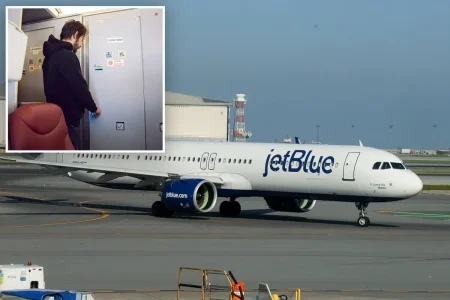American Travelers Masquerading as Canadians: The Rise of “Flag-Jacking”
In a practice known as “flag-jacking,” American travelers are increasingly disguising themselves as Canadians while abroad, sparking frustration north of the border. This trend, though not new, has gained renewed popularity as anti-American sentiment reportedly rises in various parts of the world. By sewing Canadian flags onto their backpacks or attempting to mimic Canadian accents, some Americans hope to receive more favorable treatment from locals in foreign countries. As Canadian Tod Maffin, a former public radio host, expressed in a viral video with over 100,000 views, “Every time America breaks something overseas…suddenly you can’t swing a baguette in Europe without hitting a backpack with a fresh Canadian flag sewn on the back.” While acknowledging that Canadians might be “flattered” by Americans choosing their nationality as a disguise, Maffin emphatically stated that Canada is not to be used as an “invisibility cloak” for Americans hoping to escape the consequences of their country’s global reputation.
The phenomenon of Americans borrowing Canadian identity has struck a nerve with many Canadians who feel their national symbol is being misappropriated. Maffin humorously pointed out in his video that the “Canadian flag is not some magical device that makes people forget which country invented monster trucks, or deep fried butter, or war for profit.” He also noted that Americans’ attempts to mimic Canadian speech patterns are often unconvincing, such as when they pronounce the second “t” in “Toronto” – something authentic Canadians typically don’t do. The sentiment that “Americans think that we are their backup passport” captures the frustration felt by many Canadians who see their identity being borrowed only when convenient. This practice came back into the spotlight recently when CNN reported the story of Chelsea Metzger, a 33-year-old woman from upstate New York who resorted to flag-jacking after a confrontational experience with Canadians while vacationing in the Dominican Republic.
The tensions underlying this phenomenon reflect deeper geopolitical dynamics between the neighboring countries. Metzger described an incident where “A Canadian couple screamed at me, saying that America is selfish, and ruining everything for Canada and the world,” adding that a woman in the encounter became emotional, saying “I don’t think Americans realize that what’s going on is really affecting us here.” Experts suggest that recent tariff wars and annexation concerns have contributed to a wave of Canadian nationalism. Robert Schertzer, an associate professor of political science at the University of Toronto, explained this reaction through the lens of social psychology: “External threats are what stimulate nationalist responses. It’s what sociologists call collective effervescence, a spontaneous bubbling to the surface of sentiment.” This heightened sense of national identity makes the practice of Americans posing as Canadians particularly grating for some citizens of the Great White North.
The relationship between Canadian identity and American influence has complex historical roots. According to Schertzer, “Canadian nationalism at its core has an element of anti-Americanism,” and the emotions involved can be intense—comparable even to religious fervor for some individuals. This helps explain why an American pretending to be Canadian might trigger such strong emotional responses from those experiencing a surge in national pride, especially when that pride is partly defined in opposition to American cultural and political dominance. The practice of flag-jacking touches on sensitive questions of authenticity, respect, and the right to claim or borrow national identity. For many Canadians, seeing Americans adopt their flag as a convenience feels like a form of cultural appropriation that undermines their distinct national character while simultaneously validating their belief that Canadian identity is preferable on the world stage.
Public reactions from Canadians to this trend have varied widely, as evidenced by comments on a busy Reddit thread discussing the CNN article. Some expressed annoyance, with one commenter noting that “Americans have been stealing goodwill by pretending to be Canadian and giving Canadians bad reputations by still acting like Americans abroad for decades.” Others took a more measured approach, describing the practice as “pathetic” rather than infuriating. There was also a hint of national pride in some responses, with one person suggesting that Canadians are “probably a bit flattered as it reaffirms our belief that we’re more well liked around the world than Americans.” This mix of reactions reveals the nuanced feelings Canadians have about their national identity and its relationship to their southern neighbors—a combination of pride, protectiveness, and pragmatic recognition of the realities of international perception.
Not all Canadians object to Americans borrowing their flag, however. Some take a more compassionate view, acknowledging the challenges Americans might face while traveling and showing solidarity with individuals rather than focusing on national differences. As one Reddit commenter succinctly put it, “America sucks. But not every American does. As a Canadian, I have no qualms with good Americans borrowing our flag to have a beer in peace.” This perspective recognizes the human dimension behind flag-jacking—that it often stems from individual Americans’ desire to be judged on their own merits rather than through the lens of their country’s policies or stereotypes. The phenomenon of flag-jacking ultimately highlights the complex interplay between national identity, international relations, and personal experience in a globalized world where borders are simultaneously more permeable and more politically charged than ever before. For Americans considering whether to sew a maple leaf onto their backpack, the practice raises questions about authenticity and respect, while for Canadians, it presents a challenge to national identity that is both flattering and frustrating.














